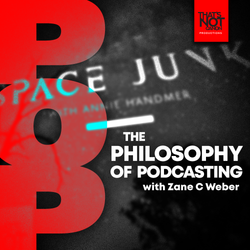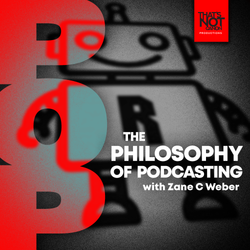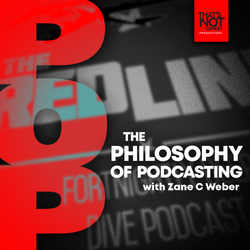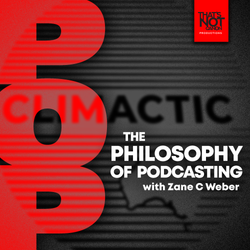Share

The Philosophy of Podcasting
The Philosophy of Podcasting
Zane C Weber lives and breathes podcasts and podcasting. Having listened to them from before iPods we even a thing, and dedicating every waking hour to this emerging artform, they are creating this podcast to ask the simple question; What does podcasting mean, for life, the universe and everything?
In 2005, the New Oxford American Dictionary selected ‘podcast’ as its word of the year meaning that enough people were making podcasts, listening to them, or at least uttering the word podcast in everyday contexts to warrant the announcement. But despite occasioning a media sensation, the actual extent of podcasting is still unknown.
The dictionary definition for the neologism was simple: ‘a digital recording of a radio broadcast or similar programme made available on the internet for downloading to a personal audio player’ BUT podcasting is a considerably more vexed term. Simultaneously conjuring notions of personal freedom and escape from the vice-grip of commercial broadcasting.
For futurists, hobbyists, and not-for-profits, podcasts embody a new, more democratic kind of expression. For media companies and other corporations, they represent a new way to connect to niche audiences and another potential revenue stream. But can the two exist side-by-side?
More episodes
View all episodes

Annie Handmer of Space Junk
36:17|Annie Handmer is a PhD Candidate at the University of Sydney’s Faculty of Science, in the School of History and Philosophy of Science. She has a Bachelor of Arts (Hons) in Philosophy, with Honours in History and Philosophy of Science, also from the University of Sydney. Annie’s research focuses on the sociology of science and scientific cooperation in extreme environments. Currently focusing on the interface between science, society, and military activities Outer Space, with her Honours thesis on scientific cooperation between the USSR, France, and the USA in Antarctica. In addition to her academic studies, she is a member of the History of Science Society, the Society for the History of Technology, the Space Generation Advisory Council, the Space Industry Association of Australia, the Australia and New Zealand Space Law Interest Group, the AYAA Aerospace Futures Committee, and is also the host and creator of the Space Junk Podcast. Spacejunk is the opposite of those slick productions which gently pour information and ideas into your ears with the smooth grace of Mr. Wickham. Nor is it charming and entertaining like Mr. Bingley. Instead, it's basically Mr. Darcy - it's complex, difficult, inaccessible, esoteric, and occasionally goes quiet without warning for months at a time. If it worked for Austen, it can work for Annie. But what it lacks in smooth production value it makes up for in relentless intellectualism. You can rest assured that you're just getting raw ideas. There's no agenda, it's not commercially sponsored, and only do enough editing to make it listenable. Even then, it's sometimes not. But it'll always make you think! You can find Zane on LinkedIn, tncpodcasting.com, thatsnotcanon.com, or you can email them at hello@thatsnotcanon.com
Melanie De Gioia of Ramaley Media
35:22|Discovering podcasts was a pivotal moment in Melanie’s life. It was a moment that showed her the path to Ramaley Media. For over 20 years Mel worked extensively in the IT space, never realising she should be considered as working within STEM. It wasn’t until she started her first podcast – Beer with an engineer – that Mel really realised her passion for being a STEM Advocate. And through Ramaley Media, Mel is shining a light on all things STEM to encourage and inspire the world. The goal of Ramaley Media is to take existing knowledge and rearrange it so that it can be perceived in an easier and more engaging manner. In 2001 Dr. Judith Ramaley coined the acronym STEM for the first time in reference to Science, Technology, Engineering, and Maths. Prior to that, it was referred to as SMET – “I didn’t like the sound of that word,” Ramaley is quoted as saying. Ramaley Media honours the key concept of what Dr. Ramaley did back in 2001. She took the acronym SMET and rearranged it to be STEM. This simple rearrangement forever changed the way society perceived and interacted with science, technology, engineering, and maths. She changed the world, and so will we. You can find Zane on LinkedIn, tncpodcasting.com, thatsnotcanon.com, or you can email them at hello@thatsnotcanon.com
2. Michael Hilliard of The Red Line
30:42||Season 1, Ep. 2Michael is a journalist reporting from countries including Iran, Russia, Belarus, and Kyrgyzstan, and works with sources from the White House to the Taliban. He also serves on various committees and councils for the Australian Government.The Red Line is a geopolitical think tank based in Australia, covering and analysing key issues shaping the world today.Their flagship production is The Red Line Podcast. Released fortnightly, each episode tackles one topic in-depth, examining the key players involved, the geopolitical strategies at play, and the underreported angles of the issue. Episodes of The Red Line Podcast serve as comprehensive crash courses in the issue it tackles, providing insights deeper than those found in mainstream media outlets.The Red Line Podcast is a one-of-a-kind briefing that will leave you with a deep understanding of the background, key factors, and international players shaping critical geopolitical issues.You can find Zane on LinkedIn, tncpodcasting.com, thatsnotcanon.com, or you can email them at hello@thatsnotcanon.com
1. Mark Spencer of Climactic
35:14||Season 1, Ep. 1We are talking to Mark Spencer, a podcast addict, a podcaster, AND the founder of the Climactic collective about his philosophies in podcasting and life in general.Climactic is a podcasting collective dedicated to telling stories from the climate community. Nearly 20 podcasts can be found on the Climactic Collective and they are all, in one way or another, about telling stories; stories about how people are living with the reality of the climate crisis.Mark has lived many places, including the US, NZ, China, the UK, and Australia. Climate change has become his main interest, and through Climactic and other projects he seeks to engage more people in this greatest test of humanity.www.climactic.fm and @climacticshow Podcasters Declare is a group of Australian-based climate podcasters, raising the volume on climate content, education and awareness. And you can learn more about the movement at www.podcastersdeclare.comYou can find Zane on LinkedIn, tncpodcasting.com, thatsnotcanon.com, or you can email them at hello@thatsnotcanon.com